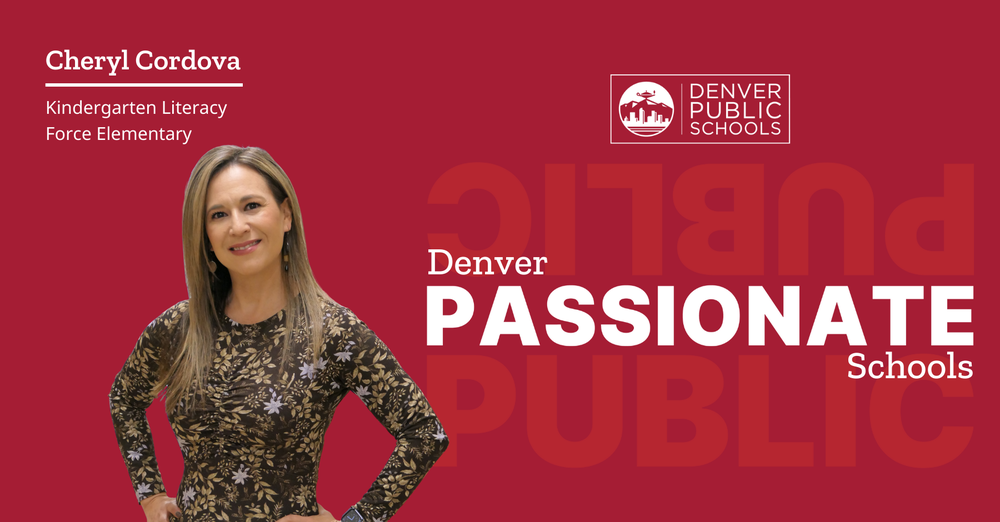Serving the same DPS community for 14 years, Cheryl Cordova knows a thing or two about how to get results from her students. A DPS Blue Ribbon Recipient in Reading, Writing and Intervention, she was able to improve her students’ READ data by 84% during the 2024-25 school year. Learn more about her passion for excelling our youth in learning!
How do you strive to impact students’ learning experiences?
I strive to impact students’ learning experiences by meeting them where they are — academically, socially and emotionally — and then guiding them forward with intentional support and high expectations. I believe that all students are capable of success, and I hold them accountable for their learning by providing clear goals, consistent feedback and opportunities for reflection and growth. My goal is to cultivate an inclusive classroom culture where every student feels valued, challenged and supported in reaching their full potential.
How do you define student success?
Student success is growth from where each student begins — socially, emotionally and academically. Every student has unique strengths, challenges and experiences, and success means helping them make meaningful progress from that starting point. I celebrate growth at all levels, whether it’s improved confidence, stronger relationships or academic gains. I celebrate them all! Ultimately, my goal is for all students to meet or exceed grade-level expectations, but I believe the journey toward that goal is just as important. When students are growing, achieving and developing the skills and mindset to take ownership of their learning, they are truly experiencing success. When you work in a kindergarten that’s considered a hard-to-serve school, many students have not had preschool experience. They walk through our doors at different levels, and education could be a brand new concept. In the beginning of the year, I would ask myself, “How do I take myself from here and get to there?” As you get going, you witness students move and grow. You watch them learn their strategies and thrive, and it gives you confidence as an educator that we can do this work.
What three things are your secrets to student success? Can you give an example?
My three “secrets” to student success are consistent communication, maintaining high expectations, and creating consistency and structure in the classroom.
Consistent Communication: Building strong communication with families about their child's education and progress (emotionally, socially and academically) is very important. It helps create trust and makes families feel valued and involved. Regular updates about how their child is doing is key. It's also important to share the next steps — what I will do in the classroom to support their child and what families can do at home. By teaching parents how to support their child's learning, showing examples and keeping them informed, we work together to help the child succeed regularly. Consistency is key to building strong readers and writers, because it helps students avoid confusion and master their skills.
Hold high expectations for all students while providing the support they need to meet those expectations. When students know I believe in their abilities, they begin to believe in themselves. For instance, I set clear academic and behavioral goals and celebrate both progress and achievement along the way.
Consistency and structure are keys to student success. A predictable, safe learning environment helps students focus and take ownership of their learning. For example, I use consistent routines and clear expectations so students always know what to expect and what’s expected of them.
What advice do you have for fellow educators who want to help their students grow and thrive?
Focus your energy on the things within your control. Avoid getting caught up in “what if” scenarios, and stay present with what’s directly in front of you. Like attendance, for example. Be present and focus on what you do have control over. When students are here, maintaining a positive and proactive mindset enables them to perform at their best, which contributes to a strong, high-morale work environment. For new educators, consistent and meaningful professional development is important. Teachers need to feel seen and acknowledged for the work they do. Education is not easy. It’s messy. Every day is an opportunity to reset and reassess what is and is not working and remain flexible in trying something new if something doesn’t work.
This year, we are launching a new campaign where we replace the word “Public” in Denver Public Schools with five empowering adjectives — Passionate, Personalized, Powerful, Prestigious and Proud — to highlight what makes DPS amazing. Which one resonates with you the most and why?
I chose the word passionate because helping children grow as thinkers, readers, writers, problem solvers and caring people matters deeply to me. I wouldn’t still be doing this work 22 years later if I didn’t truly believe in it.

